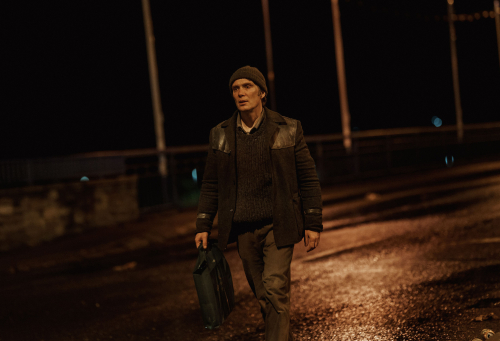
Shane O’Connor
MOVIE REVIEW
Small Things Like These (2024)
This year's Berlinale experienced protests before it began thanks to some thoughtless political posturing that goes against the festival's explicit antifascist ethos. It was a serious mistake, not least because what fascism boils down to is the negation of human empathy in exchange for rules and regulations designed to consolidate power in the hands of the chosen. That means the choice of “Small Things Like These” to open the festival is a doubly pointed reminder of the value of human kindness and the importance of empathy as a weapon.
It's the 1980s in small-town Ireland and coming up to Christmas. Bill Furlong (Cillian Murphy) is the town coalman, who employs several men in his yard but still makes the deliveries himself. He is also married to Eileen (Eileen Walsh) and the father of five daughters ranging between 8 and 18. Theirs is a peaceable home, where the girls do homework together at the kitchen table or watch “Danger Mouse” while one practices her accordion. But there's a convent on Bill's rounds and during a delivery he sees a crying teenager being forcibly dragged through the doors by her parents. Bill steps back into the coalshed and puts his head down, even though later he must stop his truck to get his feelings under control before he can drive on. And later still, when he goes through a normally closed door, the teenager (Zara Devlin) stops scrubbing the floor and runs up to him, begging for help. Help is not given. But it's only the start.
Eileen notices her husband's preoccupation and gently confronts him, but the scene that follows is perhaps handled better in the book by Claire Keegan from which Enda Walsh adapted the script. For Furlong is Bill’s mother's name – young Billy (Louis Kirwan) was raised by his mother, Sarah (Agnes O’Casey), in the home of Mrs. Wilson (Michelle Fairley), the wealthiest woman in town. So when Eileen says "it's far from hardship you were reared," it's odd indeed. This is a town so small the news of your behavior gets home before you do. When Bill has a chat with Sister Mary (Emily Watson), the pub landlady is worried enough to make it her business to suggest he needs to think of his family. So it's not possible for Eileen to be unaware that Bill was an officially fatherless child, meaning that her remark about his raising is either thoughtless or cruel. Either way the concern she expresses for their position in the town is strange indeed. Why would you marry and have a family with someone illegitimate, at a time when that concept carried a lifelong stigma, if you were unaware of the consequences?
The answer is that this is a fantasy for modern audiences about how they might have behaved when the Magdalen Laundries in Ireland were an open secret best not discussed. Some recent documentaries, such as “Nothing Compares” or “Pray for Our Sinners,” have done a more accurate job of showing not only the lifelong consequences of such places but also the societal ramifications of going against the Catholic Church in Ireland up until very, very recently. But the recent surprise success of “The Quiet Girl,” an Irish language film also adapted from a book by Ms. Keegan, as well as the global success of the TV sitcom “Derry Girls” means that Irish stories are having a moment. The participation of Mr. Murphy immediately following his role in “Oppenheimer” is a natural continuation for him, because here he is handling just as dangerous risks, just ones that would shatter the Earth in a very different way.
The idea that one quiet man would find the gumption to take on the town, his wife and the entire Catholic Church for a teenage stranger is a big leap, but Tim Mielants directs Mr. Murphy in such a way that we feel every step he takes as his feelings start to boil over. Frank van den Eeden's cinematography plays the angles – the camera rides in the back of the coal truck, for example; and Mr. Murphy's face is rarely shown full on as he scrubs the coal dust for his hands or chats to his daughters over supper. There are many great shots of shadowy figures seen through windows or in reflections. It’s young Billy's face that shown directly, whether he's disappointed with his Christmas present (a hot water bottle? Come on, Santa) or absorbing some difficult facts of life in silence. The things Bill’s adult self knows are too painful to regard directly.
But even if Mr. Murphy hadn’t been so punishingly framed throughout it would still be Ms. Watson who does the most. In the past she has played many downtrodden Irish women, most notably in “Angela's Ashes,” but recently made a huge impression in “God's Creatures” as an Irish woman who learns her son raped one of her friends and chooses her child instead the right thing. Here again her Sister Mary is convinced, from the first serpentine threats she whispers, that she is the right thing. It's obvious she sleeps the sleep of the righteous. But the teenager’s name hasn’t been hidden in this review for nothing.
How one man could do the right thing, knowing it will cost his daughters their education and his business its future, is very easy for Hollywood to show. The movie industry is usually keen to keep on the right side of history; and any story coproduced by Matt Damon and Ben Affleck will make sure it delivers, whether it's believable or not. But Mr. Mielants clearly wanted the past shown in “Small Things Like These” to be less of a mirror and more of a guide. Sometimes an act of bravery is as simple as unlocking a door, or offering someone your hand. A small thing. But when it’s an act of kindness, nothing is bigger.
Comments